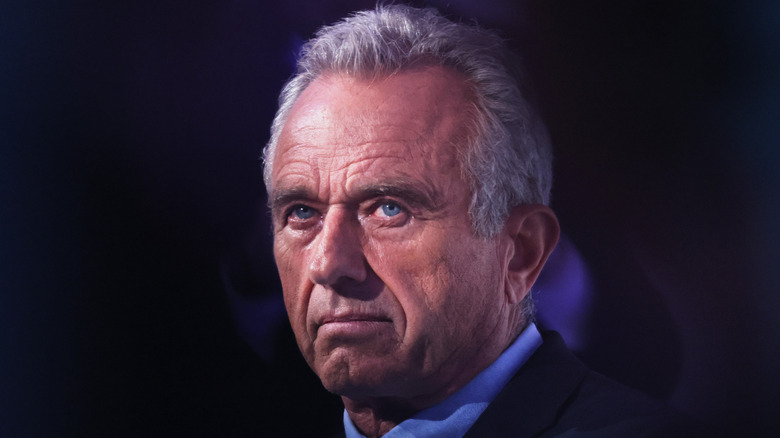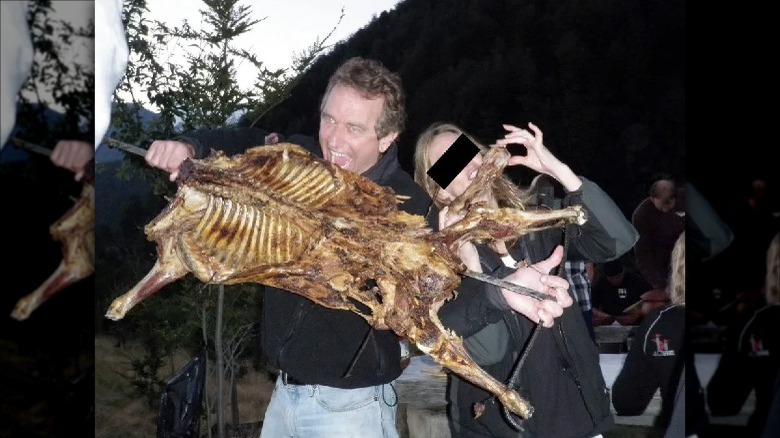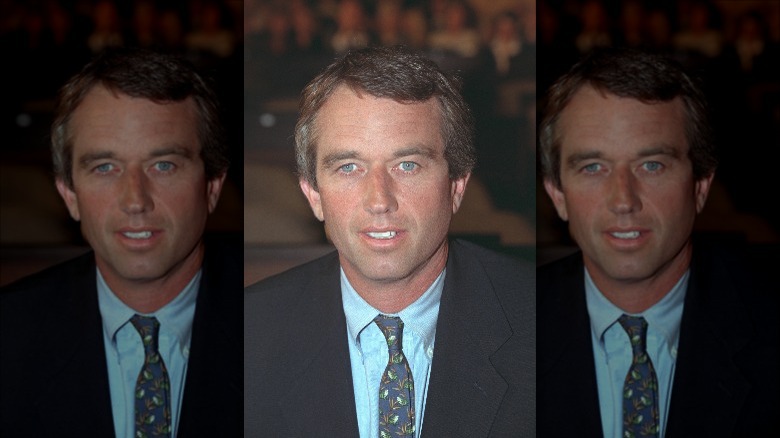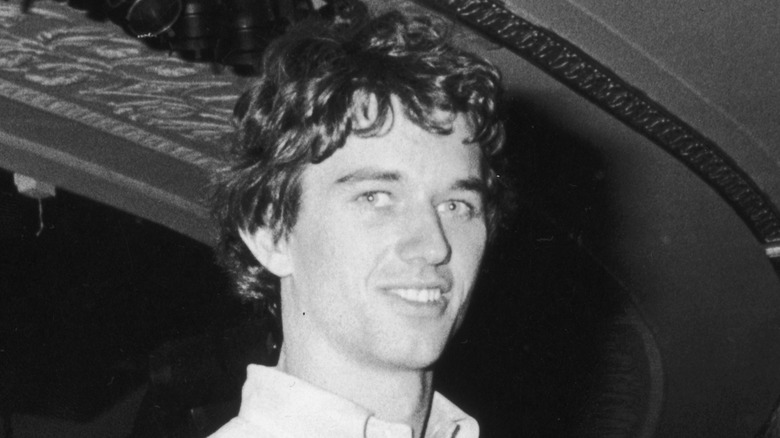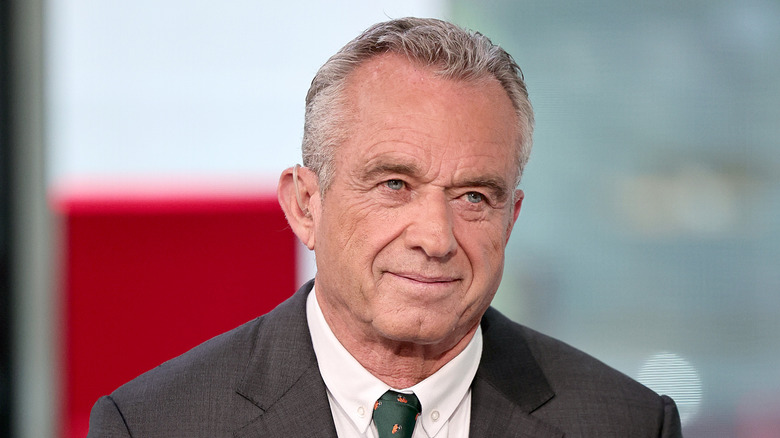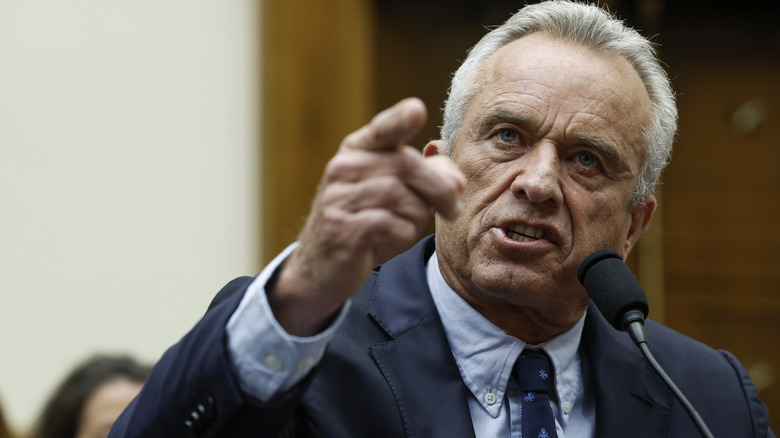Scandals That Have Brutally Rocked Robert F. Kennedy Jr.'s Reputation
This article discusses sexual assault and drug addiction.
Robert F. Kennedy Jr. has experienced plenty of tragedies, but he has also lived a life of extreme privilege, which arguably allowed him to get away with a lot more than your run-of-the-mill person. From receiving a slap on the wrist for heroin possession when working for the government to repeatedly spewing racially insensitive remarks across the board, the Independent presidential candidate has left a trail of scandals in his path. Some are less serious, albeit bizarre, like the controversy surrounding whether he ate a dog in Korea.
Others are much more harrowing — like sexual assault allegations brought forth in July 2024 by a former nanny. According to many who know him, Kennedy has always faced life without fear of consequences — partly because he was raised to believe there were none. "Like all the rest of us, Bobby grew up feeling that being a Kennedy you could do virtually anything you wanted," his cousin Chris Lawford said in the 1984 book, "The Kennedys: An American Drama" (via Vanity Fair).
Their upbringing had plus and minus sides. "It was good because you got away with things other people wouldn't dream of; it was bad because it destroyed your sense of what was worth doing," Lawford added. Kennedy has since quit drugs and put his issues with the law behind him. Nowadays, he's mostly sparking controversy over his anti-vax stances and for promoting a host of conspiracy theories. Despite all the backlash he has received, Kennedy shows no signs of slowing down.
Robert F. Kennedy Jr. was accused of eating a dog
In July 2024, Robert F. Kennedy Jr. found himself in hot water over an old photo of one of his travels. In its piece about his dark past, Vanity Fair published a picture of him and a woman holding an animal carcass while pretending to nibble at it (seen above). A friend of Kennedy's shared the 2010 photo with the magazine, contending the politician sent it in 2023 along with a recommendation for a South Korean restaurant known for serving dog meat.
A veterinarian confirmed the animal appeared to be a dog judging by the "floating rib" that differentiates it from other species. However, Kennedy denied the animal was a dog. "Hey @VanityFair, you know when your veterinary experts call a goat a dog, and your forensic experts say a photo taken in Patagonia was taken in Korea, that you've joined the ranks of supermarket tabloids," he tweeted, attaching the photo. Following the controversy, Vanity Fair deleted the vet's comments, FactCheck.Org reported.
However, it included a response from the friend to Kennedy's assertion. "He was certainly representing that this was a dog and not a goat. In any case, it's grotesque," the person said. Days later, Kennedy tweeted a video of him cooking steak and chicken for his dogs. "Because of some recent irresponsible journalism, I'm in the dog house," he wrote. In Kennedy's defense, whole lamb or goat grilled on a spit is indeed a traditional southern Argentinian dish.
Robert F. Kennedy was accused of sexual assault by a former babysitter
In the Vanity Fair article, a former babysitter for Robert F. Kennedy Jr. and his second wife, Mary Richardson, accused him of sexually assaulting her in 1998. Eliza Cooney, then 23, not only looked after Kennedy's children but also acted as an assistant for his environmental work. She was in a meeting with Kennedy and others at his house when she said he began touching her leg under the table. A few weeks later, she found a shirtless Kennedy in her bedroom requesting she apply lotion on him. "It was totally inappropriate," she said.
The worst incident happened some months later when she was in the kitchen in workout clothes. He approached from behind and touched her all over her upper body, including her breasts. "My back was to the door of the pantry, and he came up behind me," Cooney said. "I was frozen. Shocked." He stopped only when a worker walked into the kitchen. Kennedy refused to address Cooney's allegations. "I'm not going to comment on it," he said on the "Breaking Points" show on July 2, 2024.
But Kennedy criticized the profile, using the dog meat example as evidence of the reporter's lack of proper vetting. "The article is a lot of garbage," he said. While he had a lot to say about the dog controversy, he didn't explicitly deny the sexual assault accusations. "I'm not a church boy. I'm not running like that," he said.
If you or anyone you know has been a victim of sexual assault, help is available. Visit the Rape, Abuse & Incest National Network website or contact RAINN's National Helpline at 1-800-656-HOPE (4673).
RFK Jr. has a history of drug-related arrests
The first time Robert F. Kennedy Jr. was detained, he was just 16. In August 1970, He received a year of probation for possession of marijuana, The New York Times reported. His drug use, which started after his father Robert F. Kennedy's assassination in 1968, resulted in his expulsion from two boarding schools. In September 1983, Kennedy, then an assistant DA in New York, overdosed aboard a plane to Rapid City, South Dakota, Time reported.
Local police found about 1 gram of heroin and later arrested him for possession. He faced up to two years in jail for the felony but was sentenced to two years probation after pleading guilty, UPI reported. He only had to serve one year. In a court hearing, his lawyers said he was on his way to seek help for his drug addiction. "[He] was coming to South Dakota for treatment, realizing he had a problem," they told The New York Times.
Kennedy opened up about his struggles with drugs after the public overdose. "With the best medical help I can find, I am determined to beat this problem," he said in a statement shared by Time. He quit heroin with the help of a 12-step program, something he had refused to do earlier out of fear of having his addiction exposed in the media. But the plane incident changed that. "Privacy and anonymity was no longer an issue," he told GB News in 2023.
If you or anyone you know is struggling with addiction issues, help is available. Visit the Substance Abuse and Mental Health Services Administration website or contact SAMHSA's National Helpline at 1-800-662-HELP (4357).
Robert F. Kennedy Jr. compared COVID-19 vaccine mandates to Nazi Germany
A lot of Robert F. Kennedy's controversies as a politician are tied to his anti-vax stance. He had a field day during the COVID-19 pandemic. From publishing a book dedicated to bashing Dr. Anthony Fauci's handling of the health crisis in 2021 to being banned from Instagram for spreading vaccine misinformation, Kennedy sparked one controversy after the other. But perhaps the one that takes the cake is his comparison of the COVID-19 vaccine mandates to Nazi Germany.
During a January 2022 rally in Washington, D.C., Kennedy asserted that Americans living under the policy had it worse than Jews in Germany under Adolf Hitler. "Even in Hitler's Germany, you could cross the Alps to Switzerland. You could hide in an attic like Anne Frank did," he said (via AP). The backlash was so strong that even his family spoke out against it. That included Kennedy's wife, Cheryl Hines. While she initially dodged sharing her stance when pressed on X, formerly Twitter, she later minced no words.
"My husband's reference to Anne Frank at a mandate rally in D.C. was reprehensible and insensitive. The atrocities that millions endured during the Holocaust should never be compared to anyone or anything," she tweeted. Around the same time, Kennedy issued an apology. "I apologize for my reference to Anne Frank, especially to families that suffered the Holocaust horrors ... To the extent my remarks caused hurt, I am truly and deeply sorry," he tweeted.
RFK Jr. has made other racially insensitive comments
Robert F. Kennedy Jr.'s Anne Frank remarks weren't the only time he drew criticism for using the Holocaust to promote anti-vax views. In 2015, he compared the horrors committed against Jews to the effects of vaccines on children. "They get the shot, that night they have a fever of a hundred and three, they go to sleep, and three months later their brain is gone. This is a holocaust, what this is doing to our country," he said during a screening of "Trace Amounts," The Sacramento Bee reported.
Kennedy later apologized, saying the word came up during an unplanned speech. "I struggled to find an expression to convey the catastrophic tragedy of autism," he said, according to CBS News. Again in the context of the COVID-19 pandemic, he made offensive comments against Jewish people — but not only. "COVID-19 is targeted to attack Caucasians and Black people. The people who are most immune are Ashkenazi Jews and Chinese," he said in a video shared by the New York Post in July 2023.
A few months later, he went on the offensive against Palestinians amid the latest installment of the Palestinian-Israel conflict that started in October 2023. Siding with Israel, Kennedy suggested that possible solutions have been thwarted by efforts to protect civilians in Gaza. "The Palestinian people are arguably the most pampered people by international aid organizations in the history of the world," he said on "Breaking Points" in December 2023.

